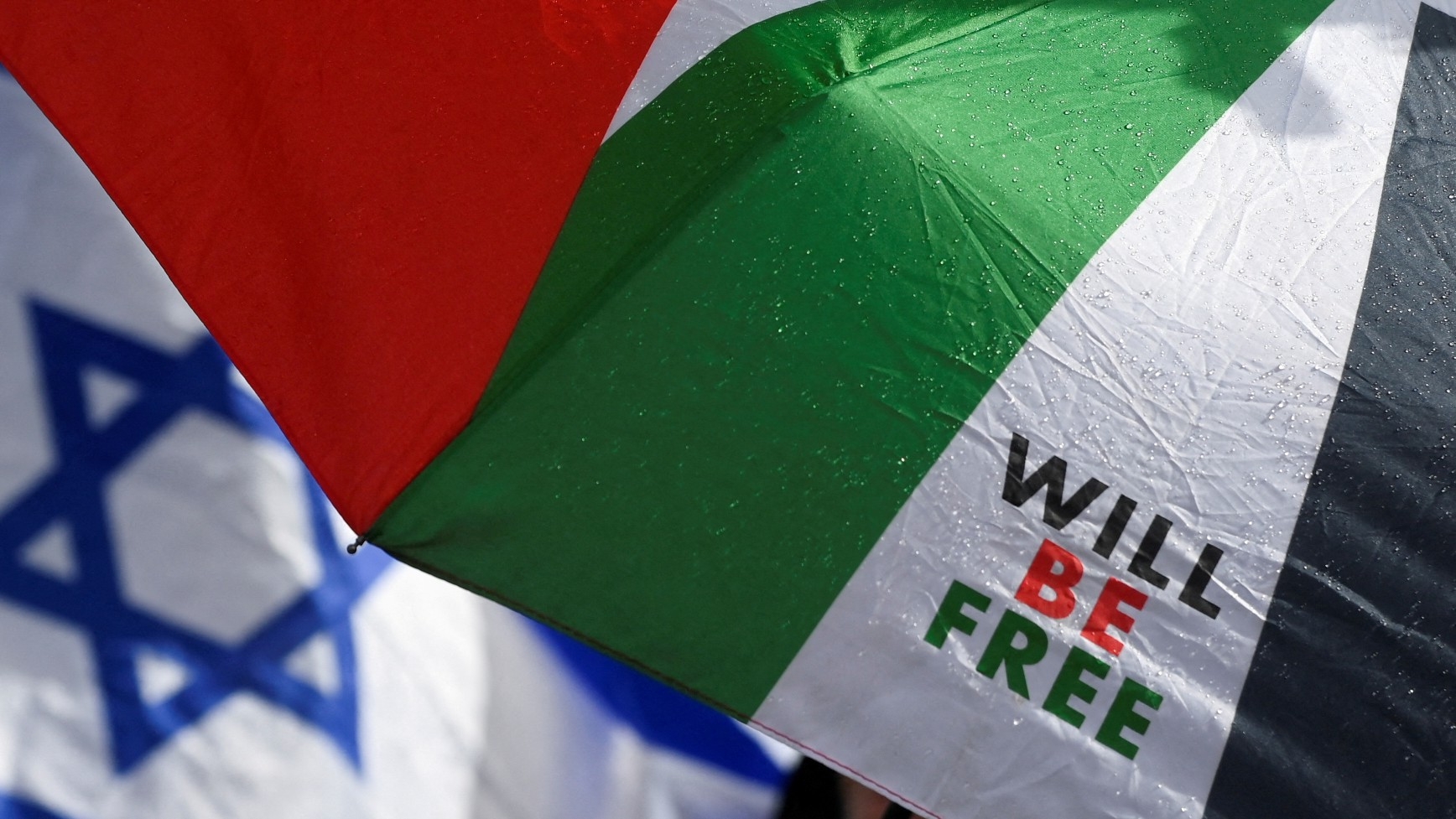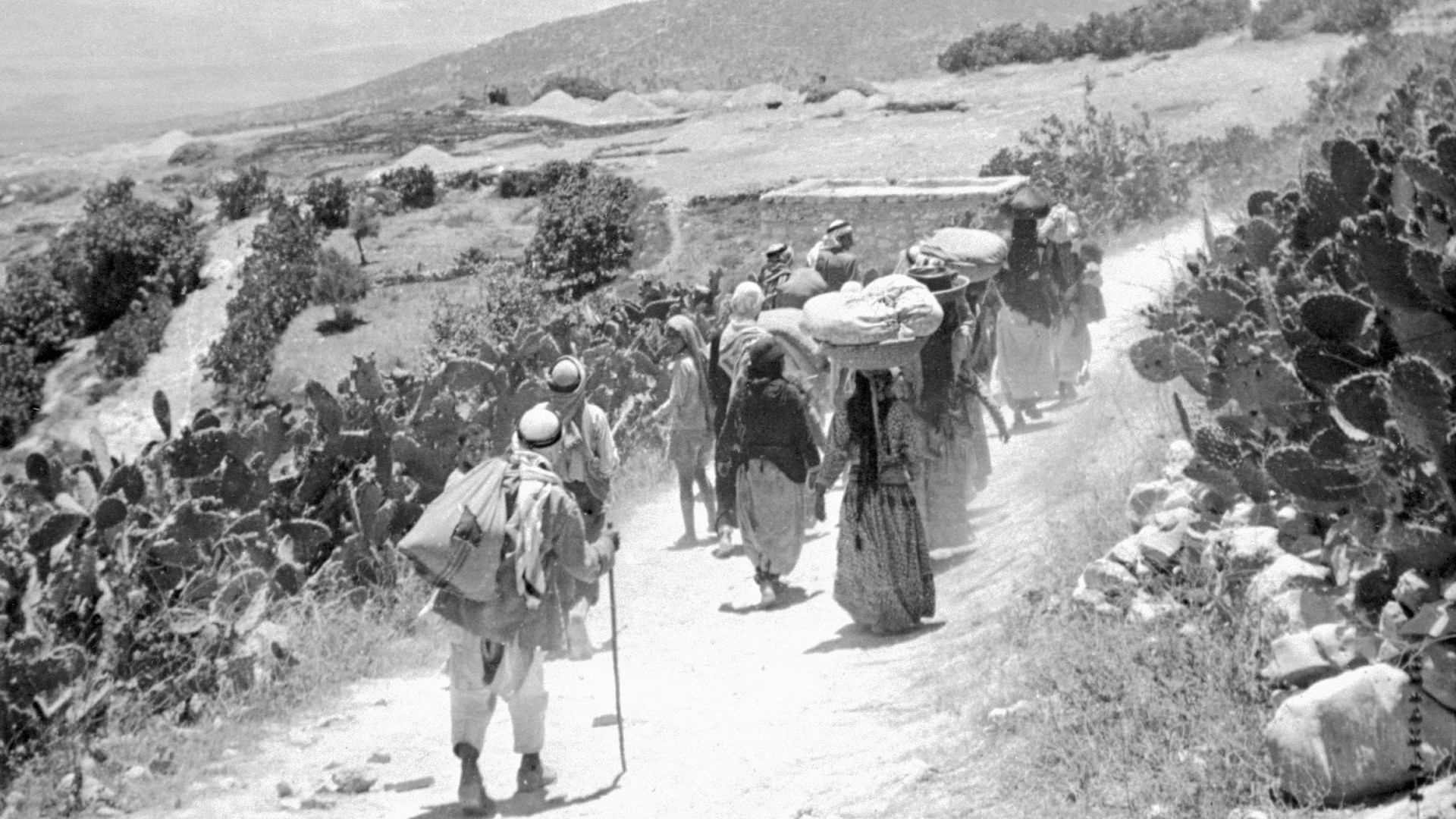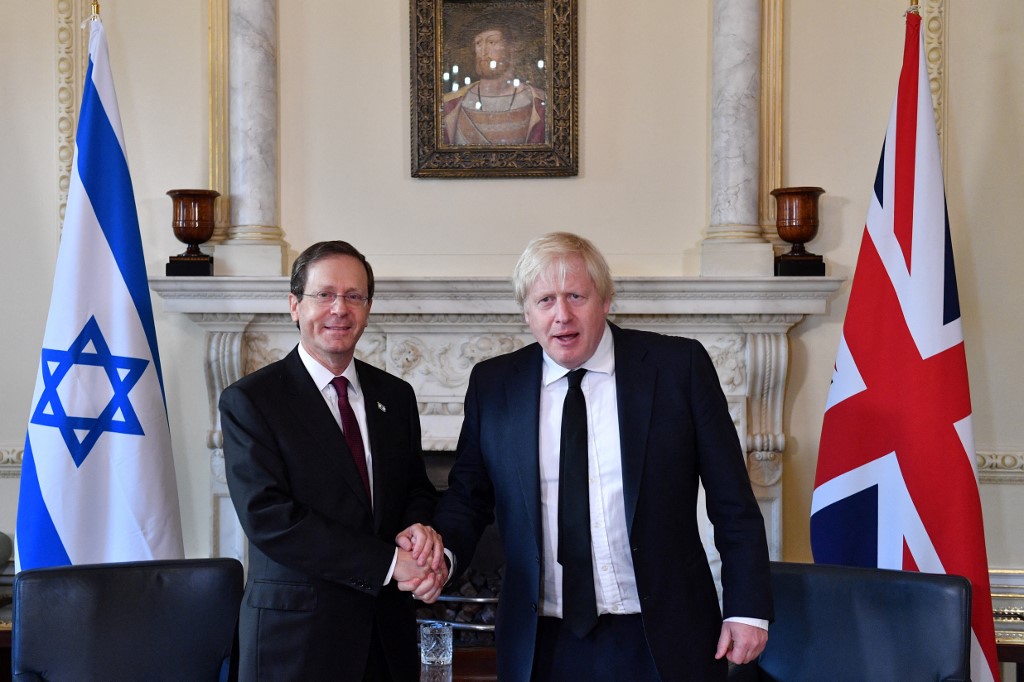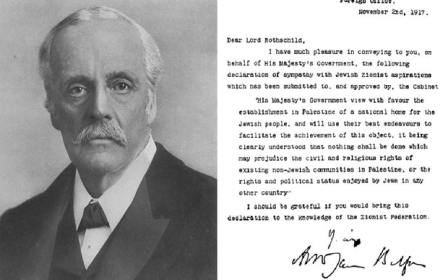Britain and the Nakba: A history of betrayal

Britain created the conditions that made the Palestinian Nakba possible.
In 1948, the Palestinians experienced a collective catastrophe of monumental proportions: some 530 villages were destroyed; more than 62,000 homes were demolished; about 13,000 Palestinians were killed; and 750,000 Palestinians, two-thirds of the Arab population of the country were driven out of their homes and became refugees.
This was the climax of the Zionist ethnic cleansing of Palestine.
In its essence, Zionism had always been a settler-colonial movement. Its ultimate aim was to build an independent Jewish state in Palestine on as much of the land as possible and with as few Arabs within its borders as possible. Zionist spokesmen constantly reiterated that they meant no harm to the Arab inhabitants of the country, that they wanted to develop the country for the benefit of both communities.
But this was largely rhetoric, kalam fadi in Arabic, empty talk.
New MEE newsletter: Jerusalem Dispatch
Sign up to get the latest insights and analysis on Israel-Palestine, alongside Turkey Unpacked and other MEE newsletters
The Zionist movement was propelled by the logic of settler colonialism. Settler colonialism is a mode of domination characterised by what historian Patrick Wolfe has termed "a logic of elimination". Settler colonial regimes seek to extinguish the native people, or at least to extinguish their political autonomy. The elimination of the native people is a precondition for expropriating the land and its natural resources.
Noam Chomsky, the eminent Jewish-American intellectual, observed that "settler colonialism is the most extreme and sadistic form of imperialism". The hallmark of settler colonialism is ruthlessness and the disregard for law, justice and morality.
The Zionist movement was nothing if not ruthless. It did not plan to cooperate with the native Arab population for the common good. On the contrary, it planned to supplant them. The only way the Zionist project could be realised and maintained was by expelling a large number of Arabs from their homes and taking over their land.
In Zionist jargon, such evictions and expulsions were deceptively referenced and concealed with a softer term - "transfer".
Path to statehood
Zionist settler colonialism was connected by an umbilical cord to Britain, the pre-eminent European colonial power of the day. Without the support of Britain, the Zionist movement could not have achieved the degree of success that it did in its quest for statehood.
Britain made it possible for its junior partner to embark on the systematic takeover of the country. Yet, the path to statehood was far from smooth. From its inception in the late 19th century, the Zionist movement encountered a major obstacle along its path: the land of its dreams was already inhabited by another people. Britain enabled the Zionists to overcome this obstacle.
On 2 November 1917, Britain issued the notorious Balfour Declaration. Named after Foreign Secretary Arthur Balfour, it promised British support for the establishment of "a national home for the Jewish people in Palestine".
The purpose of the declaration was to enlist the help of world Jewry in the war effort against Germany and the Ottoman Empire. A caveat was added that "nothing shall be done which may prejudice the civil and religious rights of existing non-Jewish communities in Palestine". While the promise was fully fulfilled, the caveat was dropped and forgotten.
In 1917, the area later called Palestine was still under Ottoman rule. The Arabs constituted 90 percent of the population of the country, with the Jews constituting 10 percent and owning only two percent of the land. The Balfour Declaration was a classic colonial document because it accorded national rights to a small minority but merely "civil and religious rights" to the majority.
To add insult to injury, it referred to the Arabs, forming the vast majority of the population, as "the non-Jewish communities in Palestine". Arab resistance to British rule was inevitable from the start.
There is an Arabic saying that something that starts crooked, remains crooked. In this case, at any rate, it is difficult to see how the British administration of Palestine could be straightened without incurring the wrath of its Zionist beneficiaries.
On 11 August 1919, Balfour wrote in an oft-quoted memorandum: "Zionism, be it right or wrong, good or bad, is rooted in age-long traditions, in present needs, in future hopes, of far profounder import than the desires and prejudices of the 700,000 Arabs who now inhabit that ancient land."
In other words, the Arabs did not count while their rights, including their natural right to national self-determination, were dismissed as no more than "desires and prejudices".
In the same memorandum, Balfour also stated that "so far as Palestine is concerned, the Powers have made no statement of fact which is not admittedly wrong, and no declaration of policy which, at least in the letter, they have not always intended to violate". There could hardly be a more arresting admission of British duplicity.
'Sacred trust of civilisation'
In July 1922, the League of Nations gave Britain the mandate over Palestine. The task of the mandatory power was to prepare the local population for self-government and to hand over power when they became capable of governing themselves.
Without the support of Britain, the Zionist movement could not have achieved the degree of success that it did in its quest for statehood
The mandates were described in the Covenant of the League as "a sacred trust of civilisation". Their declared purpose was to develop the territory for the benefit of its native people, and to turn the former Arab provinces of the defeated Ottoman Empire into modern nation-states. In reality, they were little more than a cover for neo-colonialism.
Strong Zionist lobbying induced Britain to insist on the incorporation of the Balfour Declaration into the Palestine Mandate. It is often said that this transformed a loose British promise into a binding legal obligation. This is not so for two main reasons.
First, the mandate contravened Article 22 of the Covenant, which required the people of the area concerned to be consulted in the choice of the mandatory power. Balfour refused to consult the Arabs because he knew too well that, if given a say, they would vehemently reject British rule.
Second, Britain could not assume the mandate, because in 1922 it had no sovereignty over Palestine. The sovereign until 1924 was Turkey, the successor to the Ottoman Empire. This point has been made forcefully by the American jurist John Quigley in an unpublished article entitled "Britain’s Failure to Gain Legal Standing for the Balfour Declaration". In the abstract, he summarises the argument in the following way:
"The document that Britain composed for its governance of Palestine (Mandate for Palestine) called for the implementation of the Jewish national home mentioned in the Balfour Declaration. However, Britain’s governance of Palestine, purportedly under the mandate scheme of the League of Nations, never gained a lawful foundation. The League of Nations had no power under the League Covenant to attribute legal significance to the Mandate for Palestine, or to give Britain a right to govern."
"Britain failed to gain sovereignty, which was a prerequisite for governing Palestine or for holding a mandate. Britain gave varying explanations at different times in an effort to show that it did hold sovereignty. The United Nations did not question Britain’s legal standing in Palestine but accepted the legitimacy of the mandate for Palestine as a basis for dividing the country. The issue of territorial rights in historic Palestine remains unresolved to the present time."
In Quigley’s opinion, Britain never moved past the status of belligerent occupant. He develops this argument, with a great deal of compelling evidence, in his 2022 book Britain and its Mandate Over Palestine: Legal Chicanery on a World Stage. Chicanery is not too strong a word to describe the manner in which Britain manipulated the League of Nations to give it power over Palestine, or the way in which it misused this power to turn Palestine from an Arab-majority state into a Jewish-majority state.
Obligation to protect Arab rights
The importance of including the commitment to a Jewish national home cannot be overestimated. It is what fundamentally differentiated the Palestine Mandate from all the other mandates for the Middle Eastern provinces of the Ottoman Empire.
The British mandate for Iraq, the French mandate for Syria, and the French mandate for Lebanon were all about preparing the local population for self-government. The Palestine mandate was about enabling foreigners, Jews from anywhere in the world, but especially from Europe, to join their co-religionists in Palestine and to turn the country into a Jewish-controlled national entity.
The mandate included an explicit obligation to protect the civil and religious rights of the Arabs - "the non-Jewish communities in Palestine". Britain utterly failed to protect these rights. The first British high commissioner for Palestine, Sir Herbert Samuel, was both a Jew and an ardent Zionist.
During his tenure, Britain introduced a series of ordinances that allowed for unrestricted Jewish immigration to Palestine, and Jewish purchase of lands, which Palestinians had farmed for generations.
The Arabs demanded restrictions on Jewish immigration and land acquisitions. They also demanded a democratically elected national assembly, which would reflect the demographic balance. Britain resisted all these demands and held back from introducing democratic institutions. The basic guideline for mandatory policy was to withhold elections until the Jews became the majority.
In 1936, an Arab revolt broke out against British rule in Palestine. It was a national revolt that lasted until 1939. The British army was deployed to crush it. The army acted with the utmost brutality and often in violation of the laws of war. Its methods included torture, the use of human shields, detention without trial, draconian emergency regulations, summary executions, collective punishment, house demolitions, the burning of villages and aerial bombardment.
Much of this violence was directed not just against the rebels, but against villagers who were suspected of aiding and abetting them. British counter-insurgency gravely weakened Palestinian society: around 5,000 Palestinians were killed, 15,000 injured, and 5,500 imprisoned.
Final British betrayal
Rashid Khalidi, the eminent Palestinian historian, has argued, convincingly in my opinion, that Palestine was not lost in the late 1940s, as is commonly believed, but in the late 1930s. The main reason he gives for this point of view is the devastating damage that Britain inflicted on Palestinian society and its paramilitary forces during the Arab Revolt. This argument is advanced in Khalidi’s chapter in a book co-edited by Eugene Rogan and me, The War for Palestine: Rewriting the History of 1948.
The final British betrayal of the Palestinians occurred as the struggle for Palestine entered its most crucial phase following the end of the Second World War. By this time, Britain had fallen out with its Zionist protégés and the extremists among them conducted a campaign of terror designed to drive British forces out of the country. The most notorious episode in this violent campaign was the attack, in July 1946, by the Irgun, the National Military Organisation, on the King David Hotel in Jerusalem which housed the British administrative headquarters.
Following this attack and other attacks, the embattled British government decided unilaterally to relinquish the mandate. On 29 November 1947, the United Nations passed a resolution to partition Mandate Palestine into two states, one Jewish, the other Arab.
The Jews accepted partition and the Arabs rejected it. Consequently, Britain refused to implement the UN partition plan on the grounds that it did not enjoy the support of both parties.
There was another reason, however: hostility to the Palestinian national cause. The Palestinian national movement was led by Hajj Amin al-Husseini, the grand mufti of Jerusalem, who had fallen out with the British and fled the country during the Arab Revolt.
In British eyes, a Palestinian state was synonymous with a mufti state. Hostility towards the Palestinian leadership and Palestinian statehood was therefore a constant and defining factor in British foreign policy from 1947 to 1949.
The mandate ended at midnight on 14 May 1948. Britain's way out of the quandary was to encourage its client, King Abdullah of Jordan, to invade Palestine upon the expiry of the mandate, and to conquer the West Bank that the UN had allocated to the Arab state. By this time, the wily king had reached a tacit agreement with the Jewish Agency to divide up Palestine between themselves, at the expense of the Palestinians.
The tacit agreement was that the Jews would establish a Jewish state in their part of Palestine, while Abdullah would gain control over the Arab part, and that they would make peace after the dust had settled.
Fake neutrality
During the civil war that broke out in Palestine in the run-up to 14 May, Britain stood on the sidelines, thereby abdicating its responsibility to maintain law and order. Its fake neutrality inevitably helped the stronger Zionist side. During the last months of the mandate, the Zionist paramilitary forces went on the offensive and intensified the ethnic cleansing of the country.
The first big wave of Palestinian refugees happened on Britain's watch. Britain effectively abandoned the native Palestinians to the tender mercies of Zionist settler colonialists. In short, Britain actively created the conditions for its own selfish imperialist ends, in which the Palestinian catastrophe - "the Nakba" - could unfold. An unbroken thread of duplicity, mendacity, chicanery and skulduggery connects British foreign policy from the beginning of its mandate to the Nakba.
When the going got tough, the mandatory power simply cut and ran. There was no orderly transfer of power to a local body
The way in which the mandate ended was the worst blot on Britain's entire record as the great power in charge of Palestine. It showed how little Britain cared about the people it was supposed to protect and prepare for self-government.
When the going got tough, the mandatory power simply cut and ran. There was no orderly transfer of power to a local body. The "sacred trust of civilisation" had been finally, irreversibly and unforgivably brutalised and betrayed.
Lord Balfour’s dream turned into a Palestinian nightmare. In the collective consciousness of the Palestinians, the Nakba is not an isolated event but a continuous historical process. Today, over 5.9 million refugees are registered with UNRWA, the United Nations agency for Palestine refugees.
Hanan Ashrawi coined the term “ongoing Nakba” to denote the continuous Palestinian experience of violence and dispossession at the hands of Zionist settler colonialism. In a speech at a UN conference in 2001, she referred to the Palestinian people as “a nation in captivity held hostage to an ongoing Nakba, as the most intricate and pervasive expression of persistent colonialism, apartheid, racism, and victimisation”.
Contradiction in British policy
It is melancholy to have to add that no British government has ever apologised for the part that Britain played in the emasculation of Historic Palestine. The last five Conservative prime ministers, starting with David Cameron, have all been staunch supporters of Israel.
In 2017, on the centenary of the Balfour Declaration, then Prime Minister Theresa May stated that it was “one of the most important letters in history. It demonstrates Britain's vital role in creating a homeland for the Jewish people. And it is an anniversary we will be marking with pride.” There was no mention of the Palestinian victims of this important letter.
Boris Johnson, in his 2014 book The Churchill Factor, described the Balfour Declaration as “bizarre”, “a tragically incoherent document” and “an exquisite piece of FO fudgerama”. But in 2015, on a trip to Israel as mayor of London, Johnson hailed the Balfour Declaration as “a great thing”.
In October 2017, in his capacity as foreign secretary, Johnson introduced a debate in the House of Commons on the Balfour Declaration. He repeated Britain’s pride in the part it played in creating a Jewish state in Palestine. Despite a large majority for recognising Palestine as a state, he declined to do so, saying the time was not right.
This exposed a basic contradiction in the heart of British policy: advocating a two-state solution but recognising only one.
Current British foreign policy is unapologetic about the Nakba and unashamedly pro-Zionist
It was left to Johnson’s successor, Liz Truss, to demonstrate the depth of Tory politicians’ indifference to Palestinian sensitivities and the length to which they would go to ingratiate themselves with Israel and its uncritical supporters in this country. During her campaign for election as Conservative Party leader, she floated the idea of moving the British embassy from Tel Aviv to Jerusalem.
Luckily, during her 49-day premiership, Truss was not able to follow up on this asinine idea.
Current British foreign policy is unapologetic about the Nakba and unashamedly pro-Zionist. A policy paper issued by the government on 21 March 2023 was entitled “2030 Roadmap for UK-Israel Bilateral Relations”. This paper covers trade and cooperation in a large number of spheres.
But it also includes a British pledge to oppose the referral of the Israel-Palestine conflict to the International Court of Justice, to oppose the global, grassroots, non-violent Boycott, Divestment, Sanctions (BDS) movement for ending the Israeli occupation, and to work towards reducing the scrutiny of Israel at the UN.
In short, the policy paper gives Israel the full spectrum of immunity for its illegal actions and indeed crimes against the Palestinian people. As such, it is a faithful reflection of the pro-Zionist bias in British foreign policy over the last 100 years.
The views expressed in this article belong to the author and do not necessarily reflect the editorial policy of Middle East Eye.
Middle East Eye delivers independent and unrivalled coverage and analysis of the Middle East, North Africa and beyond. To learn more about republishing this content and the associated fees, please fill out this form. More about MEE can be found here.







